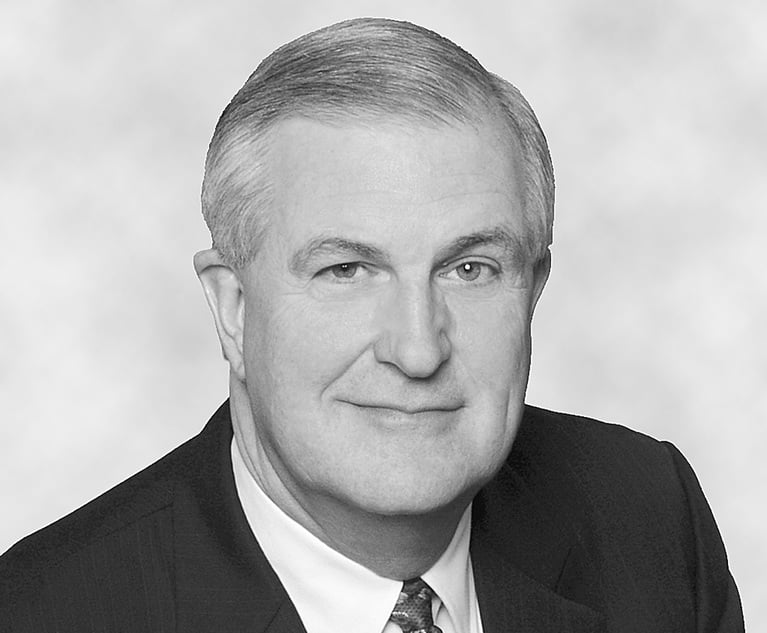 Jami Mills Vibbert.
Jami Mills Vibbert.Arnold & Porter Lands Data Security Partner as Companies Assess Changing Needs
Partner Jami Mills Vibbert joins Arnold & Porter Kaye Scholer's New York office from Venable.
May 06, 2020 at 05:22 PM
4 minute read
As more and more companies realize that working remotely is going to be a long-term concern, they have come to realize that data protection and security as it existed in the office doesn't necessarily exist at home. And that is a problem that needs to be addressed, both from a regulatory as well as a practical perspective.
Washington, D.C.-founded Arnold & Porter Kaye Scholer, identifying that need, has added former Venable privacy and data security partner Jami Mills Vibbert as a partner in its New York office, the firm announced Wednesday. She will be working primarily out of the firm's privacy and data security and life sciences and health care regulatory practices, the firm said.
"Jami is a well-known industry expert who will enhance our ability to advise our clients on the issues surrounding the protection of valuable data assets in a complex and rapidly changing regulatory environment," Arnold & Porter chairman Richard Alexander said in a statement.
Vibbert spent eight years at Norton Rose Fulbright before moving over to Venable in early 2017. She works with clients to produce data security assessments and handles crisis management during instances of data breach or regulatory investigations, Arnold & Porter said.
In an interview, Vibbert said she expects most of her existing clients to make the transition with her. She would not comment on whether others from her practice area at Venable would be making the move with her.
"I am honored to join Arnold & Porter's privacy and data security team," Vibbert said in a statement. "[I] believe that the firm's platform—including its premier life sciences and financial services practices, will allow me to provide a comprehensive offering to clients."
Vibbert's practice spans several industry verticals, but her primary stated areas of expertise are in life sciences, health care and financial services.
Her practice area is ripe for growth. As COVID-19 has given a massive push to an already changing element of work culture, companies have gone from setting their employees up to work from home to actually managing the output—and data—that moves through them.
"When remote working was brand new, there was a big uptick in asking how to be secure in working from home and with telehealth," Vibbert said. "Now, I expect there to be an increase in breach notifications. Once something is sent to a printer or data is moved via Gmail, it is out there."
Organizations are also looking for advice on the regulatory front, which due to COVID-19 has seen some changes that can have a significant effect on clients in the health care and life sciences arenas.
Vibbert said she doesn't expect any more significant changes in regulation in the vein of the Office for Civil Rights relaxing restrictions around telehealth and payments, but there will be a lot of questions regardless.
"When the return to work happens, there will be questions about what sort of health data can be shared and the safety issues that come from that," Vibbert said. "Can we track people? That will be a big issue."
Venable declined a request for comment regarding Vibbert's departure.
|Read More:
Arnold & Porter Resists Pay Cuts as COVID-19 Crisis Follows Revenue Dip
If Your Firm Has a Life Sciences Practice, It's Probably Very Busy Right Now
Ex-FDA Official Leaves Akin Gump for Arnold & Porter as Regulatory Questions Swirl
This content has been archived. It is available through our partners, LexisNexis® and Bloomberg Law.
To view this content, please continue to their sites.
Not a Lexis Subscriber?
Subscribe Now
Not a Bloomberg Law Subscriber?
Subscribe Now
NOT FOR REPRINT
© 2025 ALM Global, LLC, All Rights Reserved. Request academic re-use from www.copyright.com. All other uses, submit a request to [email protected]. For more information visit Asset & Logo Licensing.
You Might Like
View All


Milbank, Wachtell, Ropes and Pittsburgh Duo Aim to Save Nippon Steel-U.S. Steel Merger
Law Firms Mentioned
Trending Stories
Who Got The Work
Michael G. Bongiorno, Andrew Scott Dulberg and Elizabeth E. Driscoll from Wilmer Cutler Pickering Hale and Dorr have stepped in to represent Symbotic Inc., an A.I.-enabled technology platform that focuses on increasing supply chain efficiency, and other defendants in a pending shareholder derivative lawsuit. The case, filed Oct. 2 in Massachusetts District Court by the Brown Law Firm on behalf of Stephen Austen, accuses certain officers and directors of misleading investors in regard to Symbotic's potential for margin growth by failing to disclose that the company was not equipped to timely deploy its systems or manage expenses through project delays. The case, assigned to U.S. District Judge Nathaniel M. Gorton, is 1:24-cv-12522, Austen v. Cohen et al.
Who Got The Work
Edmund Polubinski and Marie Killmond of Davis Polk & Wardwell have entered appearances for data platform software development company MongoDB and other defendants in a pending shareholder derivative lawsuit. The action, filed Oct. 7 in New York Southern District Court by the Brown Law Firm, accuses the company's directors and/or officers of falsely expressing confidence in the company’s restructuring of its sales incentive plan and downplaying the severity of decreases in its upfront commitments. The case is 1:24-cv-07594, Roy v. Ittycheria et al.
Who Got The Work
Amy O. Bruchs and Kurt F. Ellison of Michael Best & Friedrich have entered appearances for Epic Systems Corp. in a pending employment discrimination lawsuit. The suit was filed Sept. 7 in Wisconsin Western District Court by Levine Eisberner LLC and Siri & Glimstad on behalf of a project manager who claims that he was wrongfully terminated after applying for a religious exemption to the defendant's COVID-19 vaccine mandate. The case, assigned to U.S. Magistrate Judge Anita Marie Boor, is 3:24-cv-00630, Secker, Nathan v. Epic Systems Corporation.
Who Got The Work
David X. Sullivan, Thomas J. Finn and Gregory A. Hall from McCarter & English have entered appearances for Sunrun Installation Services in a pending civil rights lawsuit. The complaint was filed Sept. 4 in Connecticut District Court by attorney Robert M. Berke on behalf of former employee George Edward Steins, who was arrested and charged with employing an unregistered home improvement salesperson. The complaint alleges that had Sunrun informed the Connecticut Department of Consumer Protection that the plaintiff's employment had ended in 2017 and that he no longer held Sunrun's home improvement contractor license, he would not have been hit with charges, which were dismissed in May 2024. The case, assigned to U.S. District Judge Jeffrey A. Meyer, is 3:24-cv-01423, Steins v. Sunrun, Inc. et al.
Who Got The Work
Greenberg Traurig shareholder Joshua L. Raskin has entered an appearance for boohoo.com UK Ltd. in a pending patent infringement lawsuit. The suit, filed Sept. 3 in Texas Eastern District Court by Rozier Hardt McDonough on behalf of Alto Dynamics, asserts five patents related to an online shopping platform. The case, assigned to U.S. District Judge Rodney Gilstrap, is 2:24-cv-00719, Alto Dynamics, LLC v. boohoo.com UK Limited.
Featured Firms
Law Offices of Gary Martin Hays & Associates, P.C.
(470) 294-1674
Law Offices of Mark E. Salomone
(857) 444-6468
Smith & Hassler
(713) 739-1250









